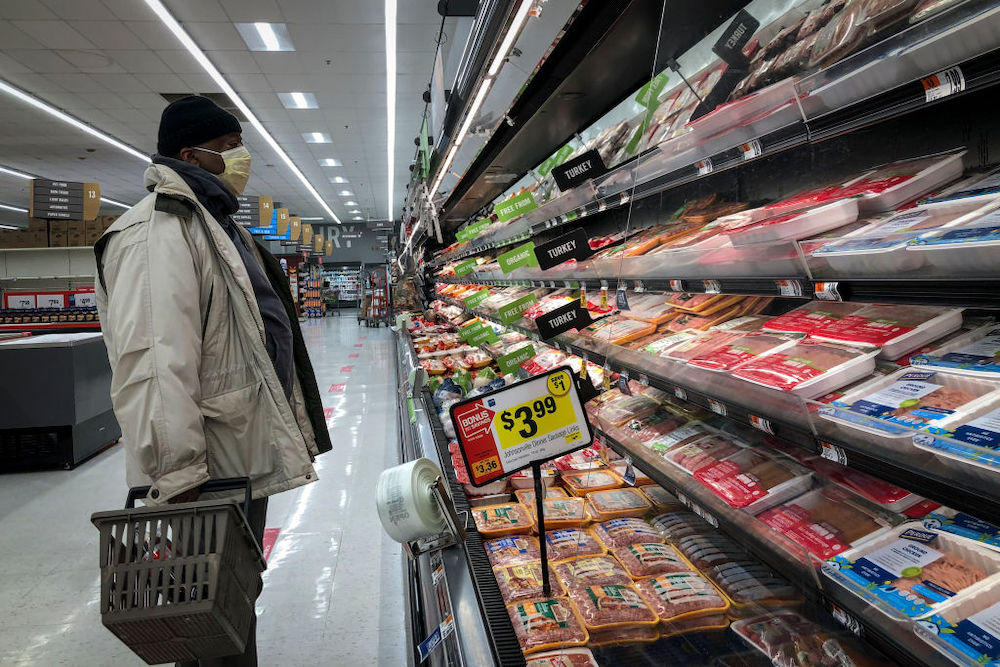- White House effort to open meat plants cheered markets, while others worried about worker health
- U.K.’s FAIRR, unions, see missed chance to tackle problems in industry
- Meat packing industry hit hard by pandemic, with plant closures and thousands of sick workers, while rising meat prices alarm an increasingly strapped public.
Markets, the meat industry and consumers cheered last week when the White House stepped in to halt closures of meat processing plants amid a rash of worker illnesses and deaths, showing support for President Trump’s claim that the country’s food supply had to be protected.
Unions, environmentalists and investors focused on impact issues didn’t share in the celebration. Instead, they’re seeing the executive order as a missed opportunity, a once-in-a-generation chance to reform working conditions in the food processing industry, cut the odds of future pandemics and reduce carbon emissions.
As shares in meat packers like Tyson Foods and Pilgrim’s Pride gained following the executive order, U.K.-based FAIRR Initiative put out a statement calling it a “historic mistake that is sowing the seeds for future pandemics.” The group, whose name stands for Farm Animal Investment Risk & Return, said the measure was a short-term fix that sidesteps broader problems in the U.S. food supply chain.
“We’re sending workers into plants at this point and thousands have gotten ill,” FAIRR executive director Maria Lettini told Karma in an interview. “Social distancing is difficult to put into place, and diseases are prolific and spread rapidly.”
FAIRR, founded by British investor Jeremy Coller, and claiming the support of investors overseeing $20 trillion in assets, was hardly alone in condemning the White House order. The Environmental Working Group said it was “tantamount to a death sentence” for workers who need adequate protective equipment, proper space and free testing. The group also called on the president to have the Occupational Safety and Health Administration issue new standards to protect the workers.
Unions and worker advocates also slammed the move, but at the same time others said it will help since nearly two dozen packing plants have closed. They see jobs saved, food prices stabilized and a win for the U.S. public at a time when the pandemic has upended life — killing and sickening thousands, and tossing millions from work.
“We’re sending workers into plants at this point and thousands have gotten ill.”
While some consumers have been greeted by reduced selections and empty shelves in grocers’ meat cases, FAIRR’s Lettini takes issue with the idea that closing plants is sparking a food crisis. “There’s no food shortage,” she said. “A meat supply crisis isn’t a food supply crisis. We can do without meat. This isn’t as important as Trump is making it out to be.”
Still, the focus on sick workers and problems in the food supply may present the latest opportunity to push consumers, and investors, toward plant-based protein and other alternative forms of meat, Lettini said.
They are also a reminder of the environmental cost of large-scale beef production, she said, as well as risks to investors. Environmental, social and governance factors are increasingly weighed by funds, lenders and rating services, and meat plants may be seen in the future as risks in a portfolio.
“It’s a moment for mainstream and impact investors,” she said.
If meat companies don’t take steps to clean up, and ratings agencies see risks of sickness outbreaks rising, they may see borrowing costs increase. That boosts the potential for plants to become so-called stranded assets, where the value of the plant falls below money still owed or investment ratings are cut, Lettini said.
“The cost of capital, when they go to market, may be much higher,” she said. “Investors might not be inclined to invest because they don’t see long-term viability and may invest in plant-based alternatives.”
However, not all investors are dumping processing stocks. Meat consumption is expected to continue to grow over the coming years. Tyson has been a darling for investors: shares have grown three-times faster than broader markets over the past 40 years according to a Barron’s piece last week that called the company a good bet to bounce back from the pandemic.
Photo by Drew Angerer/Getty Images






















